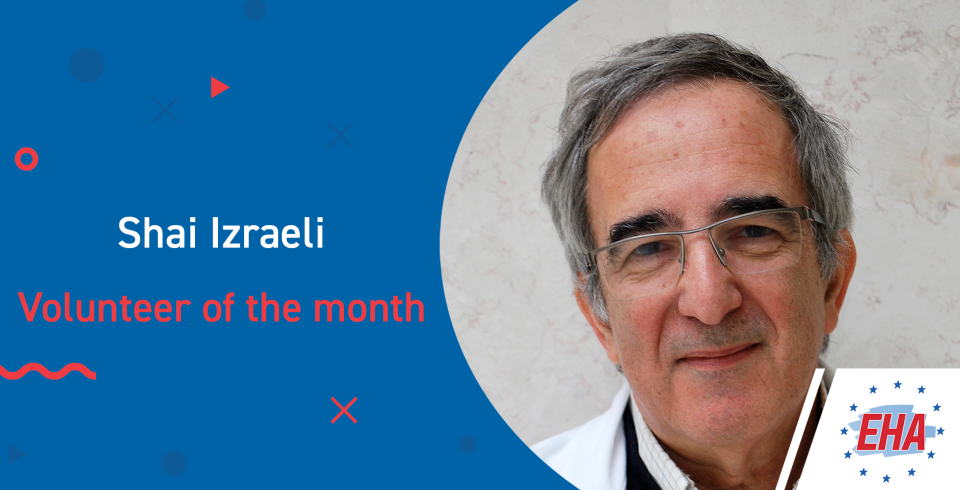This information originally appeared on the previous EHA website. Links to other pages may be inactive.

- Can you tell us what you do for EHA and when you started?
I am currently the EHA Treasurer, a member of the Executive Board, and the incoming Chair of the Research Committee. I have been a member of several committees – Scientific Program Committee (SPC), which I also chaired, Fellowships and Grants Committee and the Scientific Working Group (SWG) Committee. I have also been a faculty member of the TRTH program, training young outstanding hematology researchers in collaboration with ASH, I co-founded the YoungEHA committee, and most recently, the Pediatric SWG. I also participated several times in EHA outreach activities and in the special biannual EHA pediatric educational course.
- How did you become a volunteer? Who helped/encouraged you to become one?
My first EHA congress was 2006 in Vienna, when I was invited to give a talk by Prof Irene Roberts who was the head of the scientific program. She then encouraged me to join EHA and to be the “pediatric hematology” representative in the SPC headed by Prof Radek Skoda. I served three years in that committee and was “hooked”.
- What is your motivation on volunteering for EHA / why do you choose to serve EHA?
My motivation for volunteering with EHA is closely linked with what led me to choose pediatric hemato-oncology. I always wanted to be a physician scientist, but what drove me to hematology was the encounter with patients. There was this 5-year old girl that I treated as a pediatric resident. She died in 1992 from chronic myeloid leukemia and that left a scar in my heart. Now, she would have lived with just a pill – Imatinib – a targeted therapy that was the ultimate result of many years of research. Indeed, we live in a fantastic era – when I was an intern less than 50% of children with leukemia were cured, and now the rate is up to 90%. This is not only for pediatric leukemias; it is true for almost any area in hematology. Myeloma, CLL, acute adult leukemias, and lymphomas are becoming curable diseases. Gene therapies are about to change the outlook of inherited hematological diseases. This is an exciting time demonstrating the critical role of research. Research changes patients’ lives!
So my (and my colleagues’) mission in EHA has been to promote research by both PhDs and, especially by the special “strain” of physician scientists (or “clinicians scientists” as they are called in the UK). These efforts have dramatically changed EHA since my first encounter during the 2006 Vienna EHA Annual Congress. We have invested in the young scientists and physician scientists. We formed the YoungEHA committee (I discovered my advertisement skills by drawing the YoungEHA logo). We created grants for young researchers and young physician scientists. We developed training courses for lab researchers (TRTH) and clinical researchers (CRTH). We completely changed the annual congress by adding research tracks. Starting in the EHA congress in Madrid where I led the SPC, we (together with Prof Ruud Delwel) created the pre-EHA congress research meeting in which PhD students and postdocs from leading regional research labs present their research. This research meeting has become an incredibly successful tradition. Through these efforts, research has become an integrated pillar of EHA and of hematology in Europe.
The next decade will be transformative in all areas of medicine. Hematology has always led in incorporating science and technologies. EHA is going to play a major role in this transformative era.
- What does volunteering for EHA give you/do for you?
I must admit that in addition to the ability to serve the hematology community of Europe and beyond, it is the companionship with many hematology physicians and scientists around the world that I enjoy most.
I discovered the fantastic physicians and scientist volunteers sharing the goal of promoting hematology in Europe. During my tenure in EHA, I also discovered the unique people working in the EHA office. These young people are completely committed to the EHA mission. They are available 24/7. There is a true partnership with us – the physicians, scientists, volunteers, and employees. This partnership reached its peak recently during the Corona epidemic. We had a mission: to serve the hematology community in Europe by converting the physical congress into a virtual one. We, the scientist volunteers and the EHA office, did it by days and nights of working together. The response from the hematology community worldwide to our virtual congress was absolutely exhilarating.
- What would you say to others who would like to volunteer for EHA as well?
Volunteering at EHA matters! If you have dreams of how to improve hematology, how to change the life of your patients, how to promote the hematology of the future – EHA is the place for you. This is the place where you will find likeminded leaders from different countries, cultures, subspecialties, and capabilities. It is the togetherness that makes the difference.